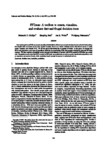FFTrees: A toolbox to create, visualize, and evaluate fast-and-frugal decision trees
| dc.contributor.author | Phillips, ND | |
| dc.contributor.author | Neth, H | |
| dc.contributor.author | Woike, Jan Kristian | |
| dc.contributor.author | Gaissmaier, W | |
| dc.date.accessioned | 2020-10-21T15:13:54Z | |
| dc.date.available | 2020-10-21T15:13:54Z | |
| dc.date.issued | 2017-07 | |
| dc.identifier.issn | 1930-2975 | |
| dc.identifier.issn | 1930-2975 | |
| dc.identifier.uri | http://hdl.handle.net/10026.1/16575 | |
| dc.description.abstract |
<jats:title>Abstract</jats:title><jats:p>Fast-and-frugal trees (FFTs) are simple algorithms that facilitate efficient and accurate decisions based on limited information. But despite their successful use in many applied domains, there is no widely available toolbox that allows anyone to easily create, visualize, and evaluate FFTs. We fill this gap by introducing the R package FFTrees. In this paper, we explain how FFTs work, introduce a new class of algorithms called fan for constructing FFTs, and provide a tutorial for using the FFTrees package. We then conduct a simulation across ten real-world datasets to test how well FFTs created by FFTrees can predict data. Simulation results show that FFTs created by FFTrees can predict data as well as popular classification algorithms such as regression and random forests, while remaining simple enough for anyone to understand and use.</jats:p> | |
| dc.format.extent | 344-368 | |
| dc.language | en | |
| dc.language.iso | en | |
| dc.publisher | Cambridge University Press (CUP) | |
| dc.subject | decision trees | |
| dc.subject | heuristics | |
| dc.subject | prediction | |
| dc.title | FFTrees: A toolbox to create, visualize, and evaluate fast-and-frugal decision trees | |
| dc.type | journal-article | |
| dc.type | Journal Article | |
| plymouth.author-url | https://www.webofscience.com/api/gateway?GWVersion=2&SrcApp=PARTNER_APP&SrcAuth=LinksAMR&KeyUT=WOS:000406792100002&DestLinkType=FullRecord&DestApp=ALL_WOS&UsrCustomerID=11bb513d99f797142bcfeffcc58ea008 | |
| plymouth.issue | 4 | |
| plymouth.volume | 12 | |
| plymouth.publication-status | Published | |
| plymouth.journal | Judgment and Decision Making | |
| dc.identifier.doi | 10.1017/s1930297500006239 | |
| plymouth.organisational-group | /Plymouth | |
| plymouth.organisational-group | /Plymouth/Faculty of Health | |
| plymouth.organisational-group | /Plymouth/Faculty of Health/School of Psychology | |
| plymouth.organisational-group | /Plymouth/REF 2021 Researchers by UoA | |
| plymouth.organisational-group | /Plymouth/REF 2021 Researchers by UoA/UoA04 Psychology, Psychiatry and Neuroscience | |
| plymouth.organisational-group | /Plymouth/REF 2021 Researchers by UoA/UoA04 Psychology, Psychiatry and Neuroscience/UoA04 Psychology, Psychiatry and Neuroscience MANUAL | |
| plymouth.organisational-group | /Plymouth/Users by role | |
| plymouth.organisational-group | /Plymouth/Users by role/Academics | |
| dc.identifier.eissn | 1930-2975 | |
| dc.rights.embargoperiod | Not known | |
| rioxxterms.versionofrecord | 10.1017/s1930297500006239 | |
| rioxxterms.licenseref.uri | http://www.rioxx.net/licenses/all-rights-reserved | |
| rioxxterms.type | Journal Article/Review |


